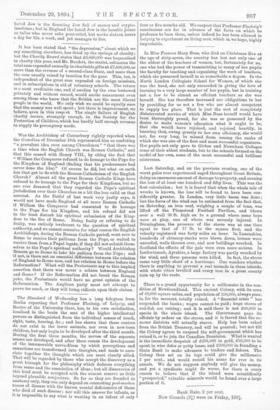Was the Archbishop of Canterbury rightly reported when the Guardian
of December 19th represented him as confuting "a prevalent idea even among Churchmen" "that there was a time when the English Church was Roman Catholic," and that this ceased with Henry VUL, by citing the fact that "William the Conqueror refused to do homage to the Pope for the Kingdom of England (finding that his predecessors had never done the like)." Of course he did, but what on earth has that got to do with the Roman Catholicism of the English Church? Almost all the great Roman Catholic Kings have refused to do homage to the Pope for their Kingdoms, but no one ever dreamed that they regarded the Pope's spiritual jurisdiction over their Churches as a bit the less valid on that account. As the Tablet of last week very justly says, it would not have made England at all more Roman Catholic if William the Conqueror had consented to do homage to the Pope for his Kingdom, and his refusal did not in the least disturb his spiritual submission of the King- dom to the See of Rome. Doing fealty or refusing to do fealty, was entirely irrelevant to the question of spiritual authority, and we cannot conceive for what reason the English Archbishops, during the Roman Catholic period, went over to Rome to receive their palliums from the Pope, or waited to receive them from a Papal legate, if they did not submit them- selves to the Pope's spiritual authority? Would Archbishop Benson go to Rome to take his pallium from the Pope ; and if not, is there not an essential difference between the relation of England to Rome now, and her relation to Rome before the Reformation? What will the Protestants say to this implied assertion that there was never a schism between England and Rome ? If the Reformation did not break the Roman yoke, the Protestants would have no great opinion of the Reformation. The Anglican party must not attempt to prove too much, or they will bring ridicule upon their claims.


































 Previous page
Previous page